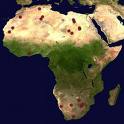U.S. Military Expansion In Africa Aimed At China
US expanding military aid to Africa – for what end?

[In] recent years have witnessed a radical shift of Africa’s role – not as a new important global player, but rather as an important playing ground for the new “Great Game”. And the country that has really changed the global attitude towards the continent is China.
The big difference in China’s attitude as compared to the West, and primarily the U.S., is that it used the so called “soft power” creating a positive impression of itself rather than twisting the arms of its partners and expanding military presence…Feeling that they might lose the competition with China if it continues to move along economic rails only, the West has resorted to the time-tested tactics of increasing its military presence.
[W]hile shifting the focus of its strategy to the Asia Pacific (i.e. to China’s immediate neighborhood) , the U.S. is ready to start a scramble for influence on “distant playgrounds” as well.
As reported by The Associated Press, speaking this week at a conference attended by representatives from African nations, General Carter Ham, head of U.S. Africa Command, said that the U.S. is carefully expanding efforts to provide intelligence, training and at times small numbers of forces to African nations, to help counter terrorist activities in the region. He also said that coordinated moves by several Africa-based terrorist groups to share their training, funding and bomb-making materials are worrisome and pose a threat to the U.S. and the region.
“Do we collect information across Africa? Yes, we do,” said Ham, singling out the Lord’s Resistance Army and its leader Joseph Kony operating in Uganda and in neighboring countries. “To have some intelligence collection capability that has the ability to monitor the areas in which we believe the Lord’s Resistance Army is operating, to be able to see, to be able to listen, to be able to collect information which we then pass to the four nations, four African nations, which are participating, I think is a good way ahead.”
General Ham also made special reference to Libya where “Al Qaeda and other terror groups want to establish a foothold”, and where “the U.S. is seeking a partnership – not a large military presence.” He also briefly mentioned Djibouti, in the Horn of Africa, where the U.S. has a military base stationing about 2,000 U.S. troops, and “small, temporary” troop presences in other nations, like Liberia, Morocco and Cameroon.
Altogether, Ham said, the U.S. has trained as many as 200,000 peacekeepers and enforcement personnel from about 25 different African nations.
The General’s statement at the conference came only a couple of weeks after The Washington Post published a lengthy article on the U.S. military expanding covert intelligence operations in Africa. According to that story, the US military is expanding its secret intelligence operations across Africa, establishing a network of small air bases to spy on terrorist hideouts from the fringes of the Sahara to jungle terrain along the equator. At the heart of the surveillance operations are small, unarmed turboprop aircraft disguised as private planes.
The operations have intensified in recent months, as part of a growing shadow war against Al Qaida affiliates and other militant groups. The surveillance is overseen by U.S. Special Operations forces but relies heavily on private military contractors and support from African troops.
In fact, both reports reflect the changing reality in the African continent which for many years was regarded as “forgotten land.” While the global economy and politics were focused elsewhere, the countries of the continent (most of which gained formal independence in early the 1960s) were by and large neglected by leading world powers and looked upon only as a source of cheap mineral resources.
But recent years have witnessed a radical shift of Africa’s role – not as a new important global player, but rather as an important playing ground for the new “Great Game”. And the country that has really changed the global attitude towards the continent is China. In recent years China has become the main trading partner for quite a number of African countries. In terms of investment, it still lags behind the U.S. and the European Union, but is swiftly narrowing the gap. The big difference in China’s attitude as compared to the West, and primarily the U.S., is that it used the so called “soft power” creating a positive impression of itself rather than twisting the arms of its partners and expanding military presence.
In any case, such developments have posed a serious threat to Western interests in Africa. Feeling that they might lose the competition with China if it continues to move along economic rails only, the West has resorted to the time-tested tactics of increasing its military presence.
The pretext may be any – the anti-terrorism fight as in the case of Africa, or even “humanitarian operations” and search for the remnants of U.S. pilots killed in World War II like the one the U.S. is planning to launch in the Indian state of Arunachal Pradesh, bordering China and disputed by the latter. But the long term goal is clear – that is, pressing China out of all spheres of vital interest.
Whether such development and the substitution of China’s “soft power” by the U.S. “hard power” is in vital interests of the affected countries themselves, is for the latter to judge. But one thing is clear – while shifting the focus of its strategy to the Asia Pacific (i.e. to China’s immediate neighborhood) , the U.S. is ready to start a scramble for influence on “distant playgrounds” as well.
Boris Volkhonsky, senior research fellow, Russian Institute for Strategic Studies
Stop NATO e-mail list home page with archives and search engine: http://groups. yahoo.com/ group/stopnato/ messages
Stop NATO website and articles: http://rickrozoff.wordpress.com
To subscribe for individual e-mails or the daily digest, unsubscribe, and otherwise change subscription status: [email protected]

